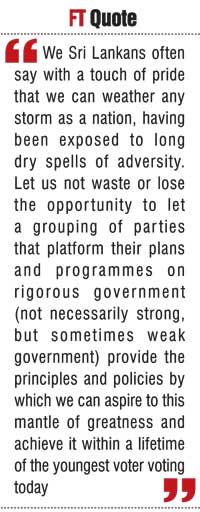Sunday Feb 15, 2026
Sunday Feb 15, 2026
Monday, 17 August 2015 00:05 - - {{hitsCtrl.values.hits}}
By the time you read this, most probably, the die would have been cast – together with your vote.
Or is there still the faintest glimmer that you’ll catch a vision of what I’m envisaging, before you rush off to your friendly neighbourhood polling station?
I hope that either way, you – and a brace or half-a-dozen good men and women true who are asking us to pick *them* from the myriad mediocre members-to-be – will be inspired by the potential of this election to change and shape the destiny of our nation; and not simply determine which party, faction, or coalition wins...
A post-war catechism
We need to emerge from the ashes and carnage of our internal, internecine, war. Other nations (Japan, Germany) have done it well, with a little help from their friends and backers (the Allies, the Marshall Plan). Even if the circumstances and situations are vastly different between WWII and our own most uncivil ‘civil war’, the principles of rebuilding, restoring, and reconciling, can be employed to remain the same. The time has come, the time is well past, for the people of Sri Lanka to vote with their feet for politicians who want to move responsibly out of the shadow of the bitter, brutal times we faced as a nation. There is a time to remember; there is a time to forget; there is a time to move resolutely on.
VOTE FOR: Those who are mindful of the sovereignty of the country, but don’t invoke communal or chauvinistic slogans to inveigle voters to back them out of fear or frustration. Don’t let ethnically loaded politics drag us back another 37 years. Learn from the history lessons of Northern Ireland, and northern and eastern and the whole of Sri Lanka – or repeat them...
A post-conflict culture
The decade or so after the end of Sri Lanka’s hugely disruptive war could and should have been set apart to help the nation transition from a torn society into a transformed synthesis. Instead, petty and narrow-minded politics made us stare into the gun-barrel of an egregiously violent culture. The war in the north may have been over, but the rest of the country soon seemed to be hidden under a frightful canopy of threat and intimidation. There were a few ruling the many, mostly with an iron hand in a velvet glove. And while the velvet glove of visible growth was pleasant to behold (beautiful parks and walkways and waterfronts) and profitable to bridge (road, rail, port, airport, other infrastructure), the iron fist when dissidence was needed to be expressed was a grim reminder that we hadn’t made the leap from military regime to mandatory republic.
Sooner than later, business and societal and religious leaders alike – many of whom supported the heavy-handed approach of accelerated development under an ostensibly corrupt administration – baulked at the prospect of growth without equity, development without equitability, peace without justice. They are right. We don’t need a kraterocracy (rule by power). We need to see something more than the ‘Singapore under Lee’ dream happen, much less a ‘Malaysia under Mahathir’ daydream. Now is a time, another time, another chance, to cultivate the Sri Lankan version of a nation-state that shook off the shackles of colonialism and corruption and aspired to newly re-democratised country status.
VOTE FOR: Those persons and parties with a political, social, cultural, and especially economic vision wherein the world will invest in an open, honest, transparent, accountable, free market economy, where their return on investment is guaranteed by stable democratic-republicanism. Vote against ostensibly benevolent tyranny that engenders corrupt cronyism under the guise of intensive national development.

A constitutionally weak presidency
The executive presidency has been the bane of our republic for almost three decades under twice as many presidents. Just think of the number of times aspiring leaders have promised to abolish the executive presidency – and then failed to do so, for cynical and self- or party-serving reasons – to remind ourselves how welcome and attractive this proposal has been, and been made to seem, to polities fed up to the back teeth with its excesses. It is not a presidential election, true... however, here’s an opportunity – within the parameters of 19A – to vote in legislators who can work well with an accountable but still somewhat instrumental chief executive.
STRENGTH: President accountable to Parliament.
WEAKNESS: President potential cat’s-paw of Prime Minister.
OPPORTUNITY: Bipartisan politics to be built up as a bulwark of democracy.
THREAT: Both President and Prime Minister being in one party, and acting in tandem on a partisan rather than a national agenda, could and will be a bastion against reasonable republicanism.
A checked-and-balanced but powerful premiership…
There is residual and growing sentiment among democrats that a mixed-Westminster style system would suit Sri Lanka better. Thus the valence towards a ‘weak’ president, and a ‘powerful’ prime minister. Which was the original rationale of the aspirants who came into power on the ‘good governance’ plank. But in this as in every other check and balance that empowers yet contains republican imperatives, we must proceed with due care and caution.
NAIVE: Prime Ministers with democratic track records can be trusted to be statesmen.
NECESSARY: Agency of good governance.
CYNICAL: It’s a scam.
An ethic of parliamentary and cabinet responsibility
The division of powers has not worked so well as it has done and been seen to be done in the past six months and more. Similarly, the separation of powers. But perhaps it is time for electors and elected alike to work more intentionally towards a *synthesis* of the branches of government? Mind you, not one that tends towards an undesirable *symbiosis* in which one man or machine or movement can set a monument up to itself and also its family/friends such that “We are the State”!
SIMPLE: Yes
STRONG: Yes
STRATEGIC: Yes
SUBVERSIVE: No
A country with a good reputation
There was once an agrarian civilisation regionally recognised as The Granary of The East. There was once a lithe modern democracy watched with envious eyes that wished to emulate its early successes: a template for Lee Kuan Yew’s fledgling Singapore. There was once a tottering near-banana republic that was held up as a negative example whose weaknesses, shortcomings, and dire failure to become or remain a functioning democracy were decried by the very Lee who upheld its exemplary early years.
Be Ceylon or Sri Lanka’s past as it may, there is a brighter, better, future that beckons. We Sri Lankans often say with a touch of pride that we can weather any storm as a nation, having been exposed to long dry spells of adversity. Let us not waste or lose the opportunity to let a grouping of parties that platform their plans and programmes on rigorous government (not necessarily strong, but sometimes weak government) provide the principles and policies by which we can aspire to this mantle of greatness and achieve it within a lifetime of the youngest voter voting today.
VOTE FOR: Those who have a demonstrably practical and implementable vision for the nation – not merely themselves, the demographic they represent and rely on, or a majority within our pluralistic state.

A great civilising regional influence
India and China are the great regional civilisations of the past. Even in the present, both are poised for regional if not international greatness – as growing economies and military-industrial powerhouses. And Sri Lanka – small, dependent on aid and protectionism, ancillary to the ambitions of our vastly more influential neighbours – may seem an island lost in the streams of time and space. However we have much that savvy politicians and incipient statesmen can build and leverage our local reputation on. Such that our global image takes on a patina and a glow, the tinges of which we began to see under the likes of the late great Srilankabhimanaya Lakshman Kadirgamar. For such a dream to materialise, we need voters and elected representatives who can transcend racial, other ethno-cultural, religious, socio-political, economic and personal/interpersonal boundaries and limit-markers that contain and restrain Sri Lankans as a people.
VOTE FOR: Visionaries, not vicious dividers of our polity into ‘traitors’ and ‘unpatriotic’ citizens. Vote against those who don’t see Sri Lanka as part of the nascent global village of which our own villagers are still only dimly aware, delighting in the narrow ultra-nationalism that provides temporary cheap election thrills but hampers our future prospects on the international stage. Vote for those who understand how the world works, and pray they will learn how the village thinks and feels soon enough to be a blessing to all – rather than the relatively better educated, world- or western-oriented minority (who read this paper, for e.g.).
CODA: A shy confession
I know, as I read back through what I’ve written above, that much – if not most – of what I’ve said is highly idealistic; even improbable. But we live in an era when the ‘impossible’ – or near-impossible – happens, and has in fact happened: a costly unwinnable war won as a pearl of great price; a corrupt unaccountable government unaccountably ousted like casting pearls before swine. So here’s hoping and dreaming that the unlikely will happen again. Long have we (you, too, dear? well, at least some of us!) dreamt that our little island-nation would take its rightful and joyous place in the sun once again. It is high time to let the high road of democratic-republicanism on which we – as a people, a polity, a power-house of principled politicians – set out seven moons or so ago to take us there.